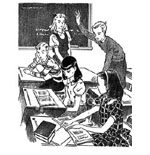
A Protestant Looks at Catholic Schools
PUBLIC SCHOOLS: BEYOND REPAIR?
Since Catholic schools account for almost half of all private schools in America, anyone who wants to understand the success of private education must examine Catholic schools. According to the federal government’s National Assessment of Educational Progress test, Catholic school students recently beat public school students by 4.5 percent in mathematics, 4.8 percent in science, and 12.5 percent in reading. Public school students are four times more likely to drop out than their Catholic school counterparts, who are 60 percent more likely to go on to college. And, amazingly, the per pupil cost of a public education is generally two to three times greater than that of a Catholic education.
Even as a Protestant who is constitutionally skeptical of any institution that offers Absolution, I must applaud such achievements. Catholic schools are attractive to parents of all Christian persuasions because they teach traditional subjects and Christian values; meanwhile, the public schools purvey their “value-neutral” desiderata. And for low income families, Catholic schools are affordable. The average elementary school tuition in the Archdiocese of New York is $1,700, with scholarships available for the needy.
In virtually every American city, public schools “accommodate diversity” by searching for the lowest common denominator among all constituent beliefs and then mandating them. The result is political correctness: Thus, in the public schools equality trumps merit, open-mindedness trumps conviction, indifference trumps tolerance, harmony trumps honesty, incentives trump morals, awareness trumps innocence, prurience trumps self-denial, freedom trumps responsibility, rights trump reverence, science trumps religion, state trumps church, and so on. The bottom line is that all is relative.
Parochial schools, in contrast, are founded on the principle that wisdom resides in the ages, not in fashionable interest groups. Catholic schools exist for the expressed purpose of instilling a basic set of values, derived from religious tenets, as moral absolutes that will guide their students through the vagaries of life. Parochial schools do not shrink from concepts like “right,” “wrong,” “good,” “evil,” or “the sin of pride.” But they also emphasize that while morals are absolute in abstract terms, one’s capacity to judge is not. Thus, they caution that even as one pursues what one believes is good, one’s righteousness maybe corrupted by pride and ambition.
You May Also Enjoy
Is Baby Doe an irreplaceable historical landmark? Why, yes.
One of the most remarkable aspects of JACK is the reader's sense of having a trustworthy guide who knows the terrain.
The Reformation was received by the great mass of Englishmen with reluctance, resentment, and resistance. Catholic England did not “pass away”; it was murdered.

